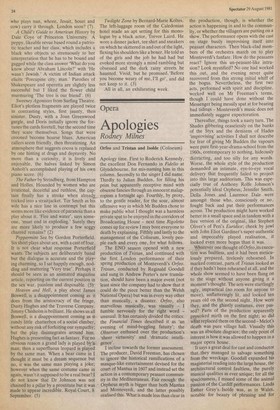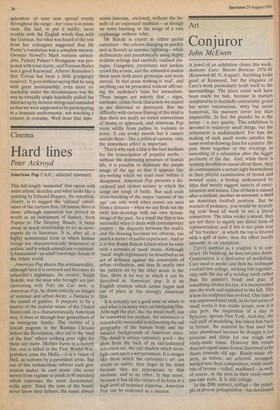Opera
Apologies
Rodney Milnes
Orfeo and Tristan and Isolde (Coliseum) Apology time. First to Roderick Kennedy, the excellent Don Fernando in Fidelio at Glyndebourne, for mis-naming him in this column. Secondly to the singer I did name. Thirdly to Julian Budden, for filling his prim but apparently receptive mind with obscene fancies through an innocent malapropism a fortnight ago. Fourthly, by proxy, to the gentle reader, for the sour, almost offensive way in which Mr Budden chose to make public what I thought was a harmless private spat to be enjoyed in the corridors of Broadcasting House — next time Rigoletto comes up for review I may bore everyone to death by explaining. Fifthly and lastly to the management of the Coliseum, lovely people each and every one, for what follows.
The ENO season opened with a new production of Tristan, and continued with the first London performance of their spring production of Monteverdi's Orfeo. Tristan, conducted by Reginald Goodall and sung in Andrew Porter's new translation, should have been a major event (not least since the company had to show that it could do the piece better than the Welsh National Opera) but was in every way other than musically, a disaster. Orfeo, also marvellous musically, was visually — I fumble nervously for the right word — unusual. It has certainly divided the critics: the Financial Times described it as 'an evening of mind-boggling fatuity'; the Observer enthused over the production's 'sheer virtuosity' and 'dramatic intelligence'.
I incline towards the former assessment. The producer, David Freeman, has chosen to ignore the historical ramifications of a masque-like entertainment devised for the court of Mantua in 1607 and instead set the action in a contemporary peasant community in the Mediterranean. Fair enough: the Orpheus myth is bigger than both Mantua and Monteverdi, and the latter possibly realised this. What is made less than clear in the production, though, is whether the action is happening in and to the community, or whether the villagers are putting on a show. The performance opens with the cast on stage busily improvising itself into peasant characters. Then black-clad members of the orchestra march on to play Monteverdi's fanfare. How do the peasants react? Ignore this un-peasant-like intrusion? Look mystified? No one had worked this out, and the evening never quite recovered from this strong initial whiff of the bogus. Nevertheless, the first two acts, performed with spirit and discipline, worked well on Mr Freeman's terms, though I could have done without the Messenger being messily spat at for bearing bad tidings — Monteverdi's music does not immediately suggest expectoration.
Thereafter, things took a nasty turn. The Shades gibbering ceaselessly on the banks of the Styx and the denizens of Hades 'improvising' activities I shall not describe for fear of giving Mr Budden the vapours were pure first-year-drama-school from the 1960s, contemporary to nothing, hideously distracting, and too silly for any words. Worse, the whole style of the production demanded an intimate, eye-to-eye vocal delivery that frequently failed to project into this large auditorium. This was especially true of Anthony Rolfe Johnson's potentially ideal Orpheus; Jennifer Smith, Della Jones and Laurence Dale were amongst those who, consciously or no, fought back and put their performances across. The production might have worked better in a small space and in tandem with a free version of the original, like Stephen Oliver's of Pen's Euridice; cheek by jowl with John Eliot Gardiner's super-authentic and impeccably played realisation, it looked even more bogus than it was.
Whatever one thought of Orfeo,its execution was faultless, and it had been meticulously prepared, tirelessly rehearsed. In marked contrast, parts of Tristan looked as if they hadn't been rehearsed at all, and the whole show seemed to have been flung on to the stage without anyone giving it a moment's thought. The sets were startlingly ugly, impractical (no room for anyone to move), unflatteringly lit, and looked ten years old on the second night. How were they, and the ghastly costumes, ever passed? Parts of the production apparently provoked mirth on the first night; so did what replaced them on the second — Melot's death was pure village hall. Visually this was an absolute disgrace; the only point of interest is how it was allowed to happen in a major opera house.
It says a great deal for cast and conductor that they managed to salvage something from the wreckage. Goodall expanded his magisterial reading into the large house, the architectural control faultless, the purely musical qualities as ever unique; for all the spaciousness, I missed some of the animal passion of the Cardiff performances. Linda Esther Gray's Isolde was, as in Wales, notable for beauty of phrasing and for splendour of tone now spread evenly throughout the range — her voice is in prime state. She had, to put it mildly, more trouble with the English words than with the German, but what was heard of the text from her colleagues suggested that Mr Porter's translation was a complete success. Gwynne Howell's Mark remains unbeatable, Felicity Palmer's Brangaene was projected with total clarity, and Norman Bailey was a good Kurwenal. Alberto Remedios's first Tristan has been a little grudgingly received. It goes without saying that he sang with great musicianship; even more remarkable under the circumstances was the way he virtually single-handedly pulled the third act up by its boot-strings and reminded us that we were supposed to be participating in a dramatic performance, not watching a concert in costume. Well done that man.



































 Previous page
Previous page